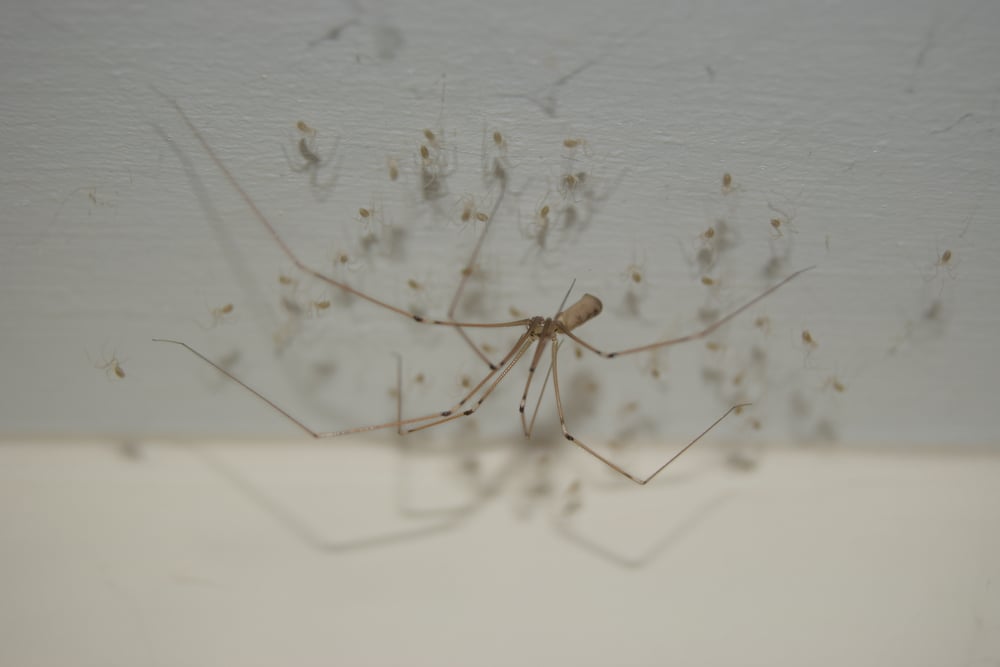The bad news: You’ve got spiders in your house.
The good news: They’re probably not poisonous and, despite the myth, you won’t eat them in your sleep.
Spiders are a common household pest. Their creepy appearance can be startling and their reputation has been inflated by stories and movies, but the truth is, house spiders are mostly harmless. Still, that doesn’t mean you want them in your home.
Spiders can lay 100s of eggs at a time, which is why it’s important to act quickly with a spider treatment plan that addresses a potential infestation before it happens. The experts at Plunkett’s know how to get rid of spiders in the basement, garage, attic, or wherever they’re spinning their webs. Contact us today to stop the spider invasion in your home.
Signs of Spider Infestation in Your House
The signs of spider infestation in a house are relatively straightforward. If your spider-sense has been tingling, here’s a checklist of major spider evidence to confirm your inklings:
- Webs. Every basement has a web or two (or more) but if you notice an increase in the amount of spider webs in your home—especially in areas where you don’t normally see them—it’s time to become more concerned about potential spider problems. Keep in mind that some species of spider make small funnel shaped webs vs the typical ringed web.
- Egg sacs. Egg sacs are tiny silk-wrapped balls. They can hold anywhere from 2-200 baby spiders and are usually laid in dark quiet places.
- Flying insects. Increased bug traffic in your home could be a calling card to local spiders that the buffet is open. Stop these other pests to prevent spiders from becoming another pest issue in your home.
- Humidity. Spiders prefer dark, moist areas. In fall, when weather becomes cooler and drier, spiders are likely to move to a more comfortable and appealing environment, such an attic, crawl space, or basement.
- Spider bites. Spiders don’t bite humans aggressively, but they will in self-defense. You may unknowingly be bitten when you reach into a closet or cupboard where a spider is hiding. Unless they’re from a poisonous spider, most spider bites will look like other insect bites – a small red, potentially itchy bump.
How to Get Rid of a Spider Infestation
Spiders enter your home for two reasons: food and shelter. If you deprive spiders of these two things, it’s likely they’ll find somewhere else to set up shop. Here are some simple steps you can take to make your lodgings less appealing to common house spiders:
Repair Cracks and Holes
Spiders can squeeze through the tiniest crack. Check your home periodically and fill in places where foundations have cracked, doors have shifted, and small gaps have appeared. This goes for your roof as well. Spiders are adept climbers that can access your upper floors via tree branches. Be sure to repair screens on doors and windows at all levels.

Vacuum
Your vacuum cleaner is an effective tool against spiders. Vacuuming up webs, egg sacs, and even spiders, prevents them from becoming embedded and increasing their numbers.
Check Your Basement
Because they are quiet, dark, and damp, basements are the most common places to find spiders. Don’t overlook your basement the next time you clean your home, spider prevention starts from the bottom up.

Keep Things Clean
Like vacuuming, a clean home discourages spiders from becoming too cozy. They prefer unkempt environments where they can easily disappear into the clutter and where there are plentiful other pests to feast on. A clean home has little to offer spiders.
Use Natural Deterrents
There are natural solutions and essential oils you can spray around your home to deter spiders (and other pests). Turns out spiders don’t care for the smell of peppermint, eucalyptus, or tea tree oil. Mix up a solution and spray in suspected areas. White vinegar works too.
Sticky traps
Commercial traps attract and ensnare spiders and other insects. You just have to deal with the traps afterward. Commercial traps attract and ensnare spiders and other insects.
Professional Spider Control
The fool-proof way to keep spiders out of your space is to hire a professional pest control team. DIY methods can work, however, it’s often easiest to let the professionals determine how to deal with a spider infestation. We can accurately identify the type of spiders, where they’re getting in, where they’re hiding, and how to eliminate them.
How to Keep Spiders Away: Plunkett’s Pest Control
Whether you have just a few tiny house spiders or a full infestation, contact Plunkett’s today for fast and effective pest control solutions. This includes exterior and interior treatments to secure your home. We keep pests in their place, not yours!








